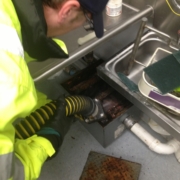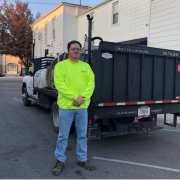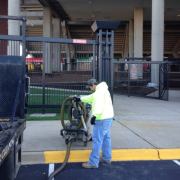8 Tips Every Restaurant Should Follow For Cleaner Grease Traps
8 Tips Every Restaurant Should Follow For Cleaner Grease Traps
Regardless of the types of food and drink a restaurant offers, grease is an inevitable challenge. Some restaurants have to deal with a lot of grease, while others manage lessor amounts. Estimates from the National Restaurant Association (NRA) project that restaurants generate upwards of 5 billion pounds of grease a year. Knowing how to effectively handle grease to prevent problems is a very important task for every food establishment.
Every restaurant and food establishment can do certain things to help reduce the amount of fats, oils and grease that go down the drain. This is important since taking precautionary measures when dealing with grease saves restaurants time, money and hassles.
As an experienced grease trap cleaning company with many years of experience, here are our tips for cleaner grease traps!
1. Make sure your employees are informed.
Not everyone knows about the best practices to cut down on the amount of FOG that gets put down the drain. Train your staff so that they understand the problems that can happen when too much grease ends up into the sewer system. Not only can this lead to clogged pipes and the obvious problems that result from that, but this can also lead to code violations resulting in citations and fines.
2. Use the garbage disposal sparingly.
While garbage disposals are beneficial in that they can help you avoid clogged sinks, they are not meant to grind up and process large amounts of food scraps. Encourage your team to avoid using the dishwasher to manage food scraps, and use the garbage instead, or even composter.
3. Use signage.
Even people that know the rules sometimes need reminders. It is beneficial to have signage near every sink and dishwasher in your kitchen area reminding people not to put grease in the drain.
4. Train your dishwashers.
While running a commercial dishwasher may seem self-evident, it is not. Make sure to train your dishwashers on best practices. This includes wiping out any grease from pots and pans before washing. Getting rid of grease in garbage bags or even through recycling is a much more efficient approach than having your grease interceptor pumped out constantly.
5. Stay on a schedule for grease interceptor cleaning.
Even if you are following all the best practices, you still need to make sure your grease interceptors stay clean. Getting on an organized schedule is the best way to do this.
6. Schedule more regular grease interceptor cleanings if you process more grease.
The regularity of your cleanings should align with the amount of grease your food establishment processes. If you deal with a lot of grease, regular cleanings are a necessity. The frequency of your grease trap cleanings are based on things like the types of food you make, your cooking methods, the techniques you use for cleaning, whether you are sit down restaurant or carry-out only. Keep in mind that if you do not clean your grease interceptors on a regular basis, this can cause some very bad smells and lead to many other problems, too.
7. Keep detailed records of every cleaning.
Write down the grease level each time you have your interceptor cleaned and keep a log so you can see patterns and be aware if anything significant changes. Keep track of the date and time of the cleaning and the person who did your cleaning. You may want to track other things too including having an employee signature of the person from your establishment who handled the cleaning.
8. Hire a reputable grease interceptor cleaning company and be aware of what they are doing.
While this may seem obvious, not every plumbing company is as skilled at handling grease trap cleaning. Make sure you choose a company that has a lot of experience and the right equipment to take on this task. In addition to thorough grease trap cleaning, you should also make sure you receive routine maintenance services. Are your baffles in place and positioned properly? Do the covers fit securely on your grease interceptors so there is no leaking? If you have an in-ground grease interceptor, it needs to be examined regularly to make sure it is not leaking.
If you are looking for experienced grease trap cleaning in Louisville, Kentucky and Southern Indiana, contact Moon Grease Trap Cleaning. Our dedicated team has many years of experience handling grease trap cleaning for restaurants and food establishments of every size. We’re MSD certified and have certification experts on staff. Our eco-friendly approach helps the environment while also saving you time and money. Contact us today at 502-776-2199 for a free estimate or more information.











